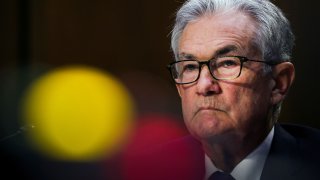
Dear Fed Chair Jerome Powell,
While I understand that inflation is currently running well above the Fed's most lofty expectations, please don't listen to those who are comparing this "inflation" to price increases of prior economic cycles.
While "transitory" may not be the appropriate phrase to describe current upward price pressures, as I have argued recently, this environment is not typical of prior business cycles that ended in rising prices, production bottlenecks and, ultimately, higher interest rates.
Just as a reminder, although I am quite certain YOU realize this, demand-pull inflation has, historically, been the result of an economy so strong that demand outstrips supply even as manufacturers are producing flat out.
Get South Florida local news, weather forecasts and entertainment stories to your inbox. Sign up for NBC South Florida newsletters.
At a cycle's peak, it's not unusual for both goods and service producers to operate at 100% of available capacity. In the case of paper, liner-board and container companies, along with chemical firms, they run in excess of 100% capacity and still can't keep pace with rising demand. That is not the case today.
Rebounding demand is overwhelming very limited supply. Auto sales are running at about a 13.4 million unit annual rate, well below the 17 million units sold in peak times.
Thanks to the computer chip shortage, new cars are hard to come by, used car prices remain elevated and dealers are carrying virtually no inventory. That is true of household appliances, technology goods and energy products as well.
Money Report
Further, the undersupply of housing units, both single and multi-family, is pushing prices to record levels just as the millennial generation in entering the family formation years.
Labor shortages, and the supply of building materials complicate the picture further. The labor markets are tighter than normal because 3.1 million people have exited the workforce since the beginning of the pandemic, accounting for more than the difference between open jobs (a record 10.4 million) and available workers.
"The Great Resignation" does not suggest that we are short workers because all available workers who want jobs have them. Quite the contrary.
As I suggested recently, the post-pandemic period is much more akin to a post-war environment where returning laborers, after a profound disruption in their lives, are demanding better pay, better working conditions, more flexibility and more job security.
Our immigration policies, such as they are, are further exacerbating labor shortages, affecting the agricultural industry, rail and trucking businesses and other lesser-skilled jobs that are going wanting for a lack of interested employees.
This isn't the 1970s
In short, we must return to Economics 101.
Raising interest rates to combat price increases that are not the result of late cycle economic activity, as may soon be contemplated, will drive the economy into a premature recession as demand is driven down to artificially low supply.
The economy can hardly withstand another recession so soon after a partial recovery from the pandemic-induced deflation of a year ago. We need more supply of goods and services, not higher interest rates.
Tapering is fine and necessary. There is no good reason to be lending support to fully functional financial markets long after such an intervention was deemed necessary.
Judging from the lack of a "taper tantrum" on Wall Street, financial markets agree.
In the absence of higher labor force participation rates, companies are very quickly turning to automation and productivity-enhancing technology. This is inherently disinflationary, if not entirely deflationary and will, relatively soon, offset wage pressures that are currently running above historical trends.
This isn't the '70s and '80s. Much more like the late '40s and '50s. I would recommend a thorough review of that period before embarking on a tightening cycle despite what those are who are barking about inflation the loudest are claiming today.






